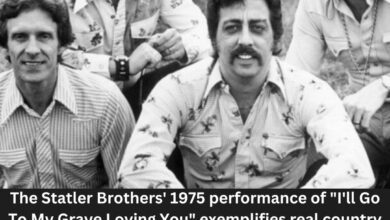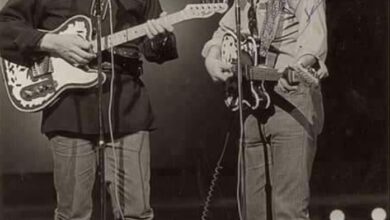“The Ballad of the Green Berets” by SSG Barry Sadler: A 1966 Military Anthem
In 1966, Staff Sergeant Barry Sadler released “The Ballad of the Green Berets,” a patriotic song that quickly became a cultural touchstone, resonating deeply with the American public during the tumultuous Vietnam War era. The song, which honors the bravery and commitment of the U.S. Army Special Forces, also known as the Green Berets, was written while Sadler was recuperating from a severe leg injury he sustained in Vietnam. Its powerful and evocative lyrics, combined with a stirring melody, captured the national mood and quickly soared to the top of the charts.
“The Ballad of the Green Berets” achieved remarkable commercial success, reaching No. 1 on the Billboard Hot 100, where it remained for five consecutive weeks. This success was notable not only for its own merits but also because it was achieved during a time when the musical landscape was dominated by the Beatles and the Rolling Stones, two of the most influential bands of the 1960s. The song’s prominence on the charts highlighted its impact and the deep connection it established with the American public.
Barry Sadler, a Green Beret medic during the Vietnam War, was profoundly influenced by his experiences in the conflict. His role as a medic and his service with the Green Berets deeply informed the lyrics of “The Ballad of the Green Berets,” reflecting both the pride and the personal sacrifice associated with military service. The song’s success led to Sadler’s early discharge from active duty and opened doors to a new career in music. Despite this promising start, Sadler’s later musical endeavors did not match the success of his debut single.
Following his initial fame, Sadler attempted to build a career in music, but his subsequent releases failed to capture the public’s interest to the same extent. His brief period of musical prominence allowed him to appear on major television programs such as The Ed Sullivan Show, but these appearances did little to sustain a long-term career in the entertainment industry. His attempts to branch out into acting, business, and writing also met with limited success.
In the late 1970s, Sadler turned to writing, embarking on a literary career that included a series of pulp fiction novels centered on the character Casca Rufio Longinus, a Roman soldier cursed to live through the ages until the Second Coming. While these novels did not achieve significant critical acclaim, they developed a dedicated readership and contributed to Sadler’s varied public persona. The series continued posthumously with contributions from other writers, maintaining a niche audience.
However, Sadler’s life took a dramatic and tragic turn in 1978 when he became involved in the fatal shooting of country music songwriter Lee Emerson Bellamy. Sadler was convicted of voluntary manslaughter for this incident, resulting in a reduced sentence. This legal trouble significantly impacted his public image and overshadowed his previous achievements. The incident marked a stark contrast to the patriotic image he had once projected.
Following the legal issues, Sadler relocated to Guatemala in the 1980s, where he continued to write and reportedly provided medical assistance to locals amidst the ongoing civil conflict. His time in Guatemala was marked by continued personal and professional challenges, but he remained committed to contributing where he could.
Tragically, Sadler’s life came to an abrupt and violent end in 1988 when he was shot in the head during a suspected robbery in Guatemala. The severity of his injuries necessitated his return to the United States, where he was placed in a coma. He remained in this state until his death, leaving behind a legacy that is as complex as it is poignant.
Barry Sadler’s story is a compelling narrative of initial success followed by profound personal and professional struggles. His brief period of musical fame, his subsequent ventures into writing, and his tragic end all contribute to a life marked by both significant achievements and considerable hardships. His impact on American culture, particularly through “The Ballad of the Green Berets,” endures as a reminder of the complex interplay between fame, personal challenges, and the pursuit of one’s passions.





